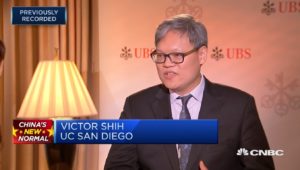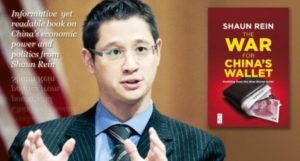 |
| Harry Broadman |
US media tend to frame their stories by dividing the world into winners and losers. In the US-China trade war they have declared the US the winner, for all the wrong reasons, writes
political analyst Harry Broadman in Forbes. In this case, the media framing is creating a dangerous and wrong myth, he writes.
Harry Broadman:
Has the trade war ratcheted up anxiety within China? Of course. There was enough underway even before the trade war began in earnest, not only economically but also on the political side. Many Chinese I know will say privately they are deeply worried about Xi Jinping’s power-grab. Not only did he deliberately stock the highest levels of the Party leadership with comrades who have no substantial independent power-base or public charisma, and thus might qualify as an heir apparent, but he also strong-armed his colleagues to alter the constitution to essentially remove term limits for the top Party position, thus paving the way—at least for now— for Xi to retain his authority as long as he likes. The political ferment these developments have produced among the population have little if anything to do with U.S. trade policy or Donald Trump. Without question, Professor Xu’s public stand is very bold, but he is hardly alone in his views. How Xi responds to Xu will be critically important in assessing China’s political path going forward.
In this vein, it would not be too Machiavellian for Xi, who desperately wants to maintain, indeed fortify, the lifeblood of the SOEs, to actually grab hold of the trade war with the U.S. as the narrative behind the economy’s growth slowdown. The bully Donald Trump is just the scapegoat Xi and the Party need now. Trump’s actions provide Xi with even greater cover to pump more money into the SOESOB shell game. (Xi’s pet project—the Belt Road Initiative (BRI)—can be seen as another version of the same ruse. BRI is the
opportunity for China to seemingly support altruistically the economic development of its backyard (and way beyond) and at the same time export the huge excess capacity of the SOEs.)
Meanwhile, the naïve Trump trade team is becoming a bit giddy about seemingly making inroads into the belly of the China trade beast. The team is wrong on three counts.
First, and what should be the most obvious, is that this White House is underestimating the determination, the conviction and, most importantly, the patience—at least for now—of the Chinese. The Chinese are nothing if they are not a patient bunch. To say that all of their initiatives throughout their history have been methodically designed for the long-haul would be a paramount understatement. I know this will come as a shock, but in many other parts of the world, short-termism and instant gratification are a way of life. Recognize the U.S. or its current President here?
Second, and which is becoming clearer each day to the U.S. population, is that Trump’s war machine is exacting a far greater toll on the U.S. than on China.
It’s well known that tariffs hurt U.S. consumers both because the imported goods they buy become more expensive, but also because in U.S. markets that are not fully competitive, domestic firms producing the same products as what is otherwise imported would have a shield that allows them to charge U.S. consumers a higher price. (Of course, that is the meaning of “protection” behind an activist tariff policy.)
At the same time, tariffs hurt firms located in the U.S. that use Chinese imports as inputs in their production process to make finalized products for sale. For them, the issue is how much of those increased input costs can they absorb before they’re forced to raise prices on their finalized products to maintain profitability. The result can be lost sales otherwise made domestically. Or if these U.S. firms export those products to third countries, there will likely be a reduction in U.S. export revenues. Of course, that will increase the U.S. trade
deficit. That’s precisely the opposite of the ultimate goal with which the Trump team is singularly obsessed. It’s a fetish that no economist worth his or her own salt would have.
But there’s an even more perverse effect: a significant amount of U.S. imports from China are produced by U.S. firms with operations within China. Those U.S. firms will be negatively impacted just the same as if they were actually Chinese firms shipping those imports to the U.S. Guess what will likely happen? Those China-located factories of U.S. firms will redirect their sales of exports from China away from the U.S. towards consumers in other markets—markets that are, by definition, not subject to the U.S. tariffs imposed on China. And if the imposition of U.S. tariffs on such exports from China become long-lasting or highly elevated, it could well create an incentive for those firms to shift production from China to other markets in Asia, especially to countries in the ASEAN, where labor costs are far lower than in the U.S. If the Trump trade team believes its tariffs on China will result in U.S. firms shifting their production from China to the US, they are sadly mistaken.
More in Forbes (here reprinted with the kind permission of the author)
Harry Broadman is a speaker at the China Speakers Bureau. Do you need him at your meeting or conference? Do get in touch or fill in our speakers' request form.
Are you looking for more experts on the ongoing trade war at the China Speakers Bureau? Do check out this list.
















